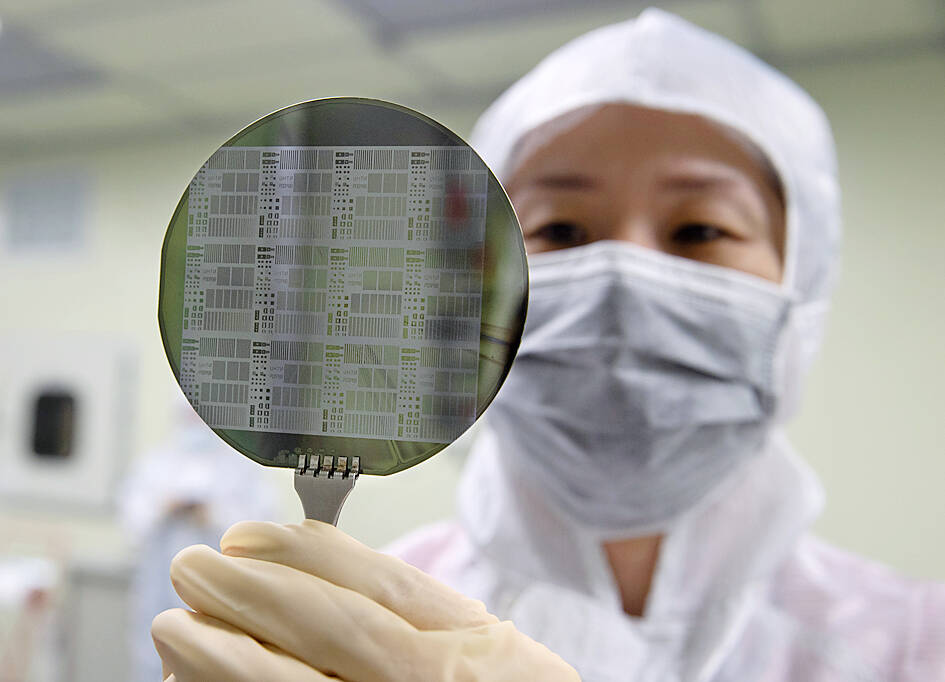Taiwan’s semiconductor industry is expected to post annual growth of 16.2 percent to top NT$6 trillion (US$183.51 billion) in production value for the first time, driven by artificial intelligence (AI) and high-performance computing devices, the Industrial Technology Research Institute (工研院) said yesterday.
That would mean that Taiwan would continue to outgrow the global semiconductor industry, which is estimated to climb 11.2 percent to NT$697.9 billion this year, the institute said.
The production value of the local semiconductor industry is expected to rise to NT$6.17 trillion this year, compared with NT$5.31 trillion last year, which was up 22.4 percent year-on-year, the institute said, adding that Taiwan would be the major beneficiary of the AI boom.

Photo: CNA
Foundry service providers, such as Taiwan Semiconductor Manufacturing Co (TSMC, 台積電), are set to outpace all other semiconductor segments again this year by growing production value by 20.1 percent to NT$3.89 trillion, accounting for 63 percent of the semiconductor industry’s total output.
TSMC last month said that its revenue this year would grow at an annual rate of 25 percent on robust AI demand and demand for advanced 3-nanometer and 2-nanometer chips.
Chip designers, led by smartphone chip designer MediaTek Inc (聯發科), followed with production value estimated to grow 11.3 percent to NT$1.41 trillion this year, marking a second straight year of growth.
Memorychip makers are to grow production value by 6.3 percent this year to NT$186.7 billion, but this segment is expected to suffer from an annual decline of 13.3 percent this quarter, marking a second consecutive quarter of contraction, the institute said.
The production value of chip packagers is to rise 8.9 percent this year to NT$460.8 billion, while chip testers are to post 9.6 percent growth to NT$219.5 billion, it said.
ASE Technology Holding Co (日月光投控), the world’s biggest provider of chip packaging and testing, last week gave an optimistic revenue growth forecast for its advanced packaging and testing services this year thanks to rising demand.

CHAMPIONS: President Lai congratulated the players’ outstanding performance, cheering them for marking a new milestone in the nation’s baseball history Taiwan on Sunday won their first Little League Baseball World Series (LLBWS) title in 29 years, as Taipei’s Dong Yuan Elementary School defeated a team from Las Vegas 7-0 in the championship game in South Williamsport, Pennsylvania. It was Taiwan’s first championship in the annual tournament since 1996, ending a nearly three-decade drought. “It has been a very long time ... and we finally made it,” Taiwan manager Lai Min-nan (賴敏男) said after the game. Lai said he last managed a Dong Yuan team in at the South Williamsport in 2015, when they were eliminated after four games. “There is

Taiwan Semiconductor Manufacturing Co (TSMC, 台積電) is expected to start construction of its 1.4-nanometer chip manufacturing facilities at the Central Taiwan Science Park (CTSP, 中部科學園區) as early as October, the Chinese-language Liberty Times (the Taipei Times’ sister newspaper) reported yesterday, citing the park administration. TSMC acquired land for the second phase of the park’s expansion in Taichung in June. Large cement, construction and facility engineering companies in central Taiwan have reportedly been receiving bids for TSMC-related projects, the report said. Supply-chain firms estimated that the business opportunities for engineering, equipment and materials supply, and back-end packaging and testing could reach as high as

POWER PLANT POLL: The TPP said the number of ‘yes’ votes showed that the energy policy should be corrected, and the KMT said the result was a win for the people’s voice The government does not rule out advanced nuclear energy generation if it meets the government’s three prerequisites, President William Lai (賴清德) said last night after the number of votes in favor of restarting a nuclear power plant outnumbered the “no” votes in a referendum yesterday. The referendum failed to pass, despite getting more “yes” votes, as the Referendum Act (公民投票法) states that the vote would only pass if the votes in favor account for more than one-fourth of the total number of eligible voters and outnumber the opposing votes. Yesterday’s referendum question was: “Do you agree that the Ma-anshan Nuclear Power Plant

Democratic nations should refrain from attending China’s upcoming large-scale military parade, which Beijing could use to sow discord among democracies, Mainland Affairs Council Deputy Minister Shen You-chung (沈有忠) said. China is scheduled to stage the parade on Wednesday next week to mark the 80th anniversary of Japan’s surrender in World War II. The event is expected to mobilize tens of thousands of participants and prominently showcase China’s military hardware. Speaking at a symposium in Taichung on Thursday, Shen said that Chinese Minister of Foreign Affairs Wang Yi (王毅) recently met with Indian Prime Minister Narendra Modi during a visit to New Delhi.